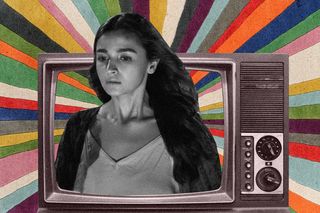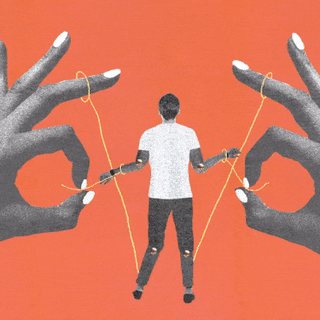
Can We Move On: From Leading Women Who Exist to Guide Their Male Lovers to Their Destinies
We’ve become accustomed to seeing women as secondary characters in the grand scheme of men’s stories.

In Can We Move On, we revisit old tropes and question whether they have any remaining cultural relevance.
Brahmastra: Part One – Shiva was among the highest-grossing Bollywood movies of this year. The lights, the colors, and the special effects that made the movie a visual marvel, though, couldn’t cover up the script’s egregious failure at including a fully-realized female lead. Instead, it brought forth yet another narrative for a leading female character that hinges solely on her ability to guide her male partner to his destiny. Alia Bhatt, who has shone through in movies like Dear Zindagi (2016), Raazi (2018), Gangubai Kathiawadi (2022), and Darlings (2022), where she played strong, nuanced female characters, was almost reduced to a manic pixie dream girl in Brahmastra.
That this is happening even today, speaks to the unmistakable presence of patriarchy in Indian filmmaking, where female leads are, more often than not, almost reduced to nannies in the grand sagas of men coming of age in their 30s and 40s. Despite including female characters in the narrative, storytelling in Bollywood rarely explores the complexity of their inner worlds — as though women’s motivations and aspirations only revolve around the men in their lives. Besides being hardly anything more than the male lead’s romantic interest, they exist to boost the movies’ aesthetic value, and on occasion, sex appeal. In the process, the message that’s sent to young, impressionable audiences is women looking pretty while selflessly playing supporting characters in their own lives is the norm — reinforcing sexist ideals.
“In Brahmastra, the award-winning, trailblazing actress Alia Bhatt — currently emblematic of the most vibrant and original talent — is reduced to a characterless, empty, Shiva-babbling prop,” notes an article describing the sexism embedded in the character arc of Isha, Bhatt’s character in the movie. “Isha dedicates her entire existence to a stranger who, on their second meeting, talks about having visions of an extra-terrestrial conspiracy ring… When Isha gets physically hurt, she downplays it… [She] stands, frame after frame, in scenes with zero dialogue and screen presence while her male counterpart continues singing, dancing, and playing with fire.”
Despite having proven her acting prowess, this isn’t the first time this year that Bhatt was cast simply as a plot device in a movie that almost single-mindedly focused on the narratives of male characters. RRR, which garnered international fame and acclaim earlier this year, also cast Bhatt in the part of Sita, who serves simply to resolve a misunderstanding between the characters of Alluri Sitarama Raju (played by Ram Charan) and Komaram Bheem (played by N.T. Rama Rao, Jr.) so that they can go back to being friends again, and flex their muscles together while beating up British officers in fits of nationalistic rage.
Yet, Bhatt is hardly the face of this trope. In 2007, Kareena Kapoor played Geet in Imtiaz Ali’s Jab We Met, which went on to become one of the most memorable characters in her acting career. Granted, Geet wasn’t nearly as one-dimensional as Isha — we were at least introduced to her family, informed of the trajectory of her life prior to meeting the male lead, and told of her ambitions, even though it mostly involved getting married and settling down in the mountains. However, for the sheer majority of the movie’s runtime, she was either inspiring Shahid Kapoor, the male lead, to do a better job at running the company he inherited, or moping about being dumped rather unceremoniously by her ex-boyfriend.
Related on The Swaddle:
Insults Like ‘Whipped,’ ‘Mama’s Boy’ Betray Society’s Anxiety About Men Being Under Women’s Control
Nargis Fakhri’s character in 2011’s Rockstar — again written and directed by Ali — is similarly reduced to the “guiding light” of Janardhan’s (played by Ranbir Kapoor) illustrious music career.
Ali, who appears to be particularly skilled at writing female characters embodying this trope, meted out the same treatment to Deepika Padukone’s character, Tara, in 2015’s Tamasha. Like Bhatt and Fakhri, she, too, is entrusted with the job of helping Ranbir Kapoor — yet again — realize his destiny. Highlighting how the movie reinforced stereotypes about women being the secondary sex, even a men’s website stated, “Tara has her own ambitions, and she is someone who wants to live her life fully, but things change after she meets Ved… Her life centers around him, and she wants to help him come out of darkness. Her sole job in the movie is to help Ved understand himself and follow his passion of being a theatre artist.”
“Such film plots diminish the personality of the female characters by reducing them to mere props in the self-journey of the hero. They rarely follow their own dreams and are always there to ‘inspire’ their male counterparts by either exaggerated optimism or an inhuman level of patience, or both of these,” reads an article, pointing out the great disservice that the trope does to society. “Not only does such a portrayal absolve men of responsibility for their actions, but also shifts the onus of their behavior on women in their life.”
Perhaps, by fortifying the notion of women being the nurturing, empathetic support systems of a man’s life — catalyzing, if not kindling, his ability to grow up and take responsibility — the trope fuels the idea, “Ladke ki shaadi karwa do, apne-aap sudhar jaayega [Get your son married off, he’ll automatically learn how to become responsible].” Basically, it preaches the passing of the baton of performing emotional labor for a man, from his mother to his wife — as though it is blasphemous for a man to shoulder any form of emotional responsibility on his own.
“As much as it shakes our roots as a woman, it also proves to be a toxic trope for men who consume it. It creates an atmosphere of brooding self-importance for them, with a complete disregard [for] developing emotional intelligence because along the way they will find a girl who will compensate for it,” notes an article on the Indian adaptation of the manic pixie dream girl.
Related on The Swaddle:
Can We Move On: From the Trope of the Woman Who Perfectly Balances Sanskaar and Sexiness
And so, over the years, countless women in cinema have sacrificed their careers at the altar of their male love interests’ success; Asin in Ghajini (2008), Katrina Kaif in Zindagi Na Milegi Dobara (2011), and Anushka Sharma in Jab Tak Hai Jaan (2012), among others, have all embodied different iterations of the manic pixie dream girl. The fact that so many female actors, often at the peak of their careers, have found themselves playing second fiddle to men in movies as successful as Brahmastra, ZNMD, and JTHJ, reveals how we’ve become used to seeing women being reduced as secondary characters in the grand scheme of men’s stories.
As Dyuti Gupta wrote in 2020, “[The trope is] representative of what the male-dominated film industry thinks about women.”
Unfortunately, that’s not where the pernicious impact of the trope ends. Having made its way into the 2010s — and now, courtesy of Brahmastra, even the 2020s — the trope has and will continue to shape gender roles in the minds of young moviegoers. Not only will yet another generation of Imtiaz Ali’s write female characters who help another generation of Ranbir Kapoors come of age at 40 — but another generation of women, too, will grow up learning that they’ll always come second to the men in their lives.
“[W]hen young girls grow up consuming [such] books and movies… all they learn is that they’ll never get to be the protagonist of their own story,” Gupta wrote.
What the future of Brahmastra holds is a matter of (intense) public debate. Meanwhile, it’s high time filmmakers stopped jeopardizing the future of humanity, though, by propagating toxic gendered ideas through tropes like this one. Can we, please, move on?
Devrupa Rakshit is an Associate Editor at The Swaddle. She is a lawyer by education, a poet by accident, a painter by shaukh, and autistic by birth. You can find her on Instagram @devruparakshit.
Related


Insults Like ‘Whipped,’ ‘Mama’s Boy’ Betray Society’s Anxiety About Men Being Under Women’s Control
